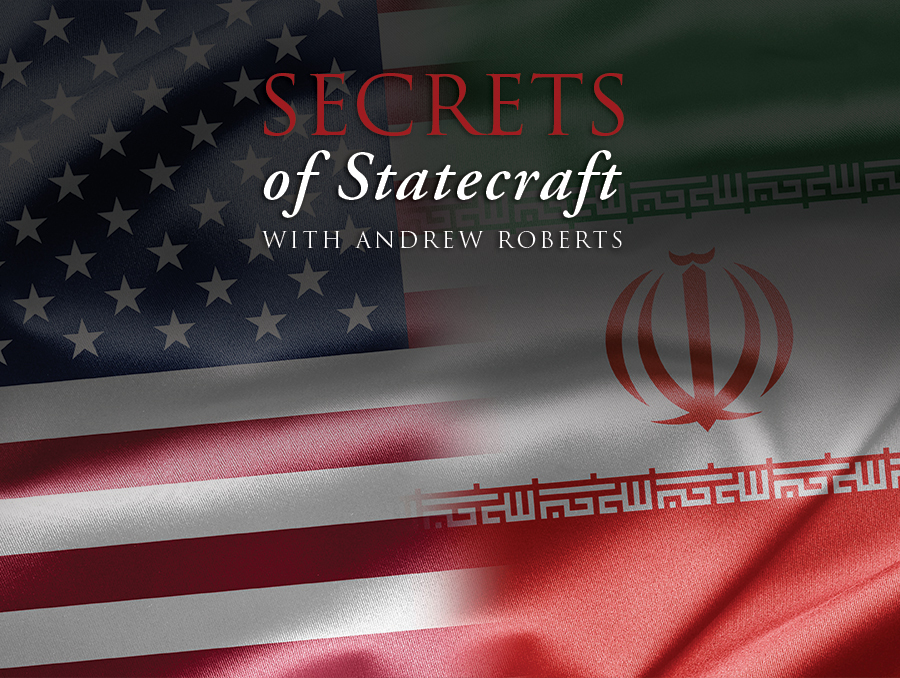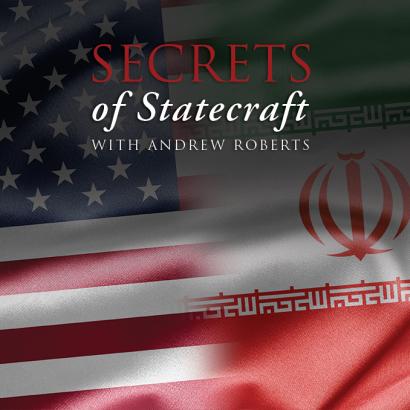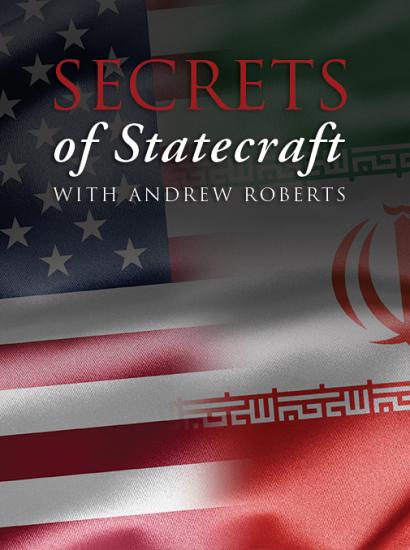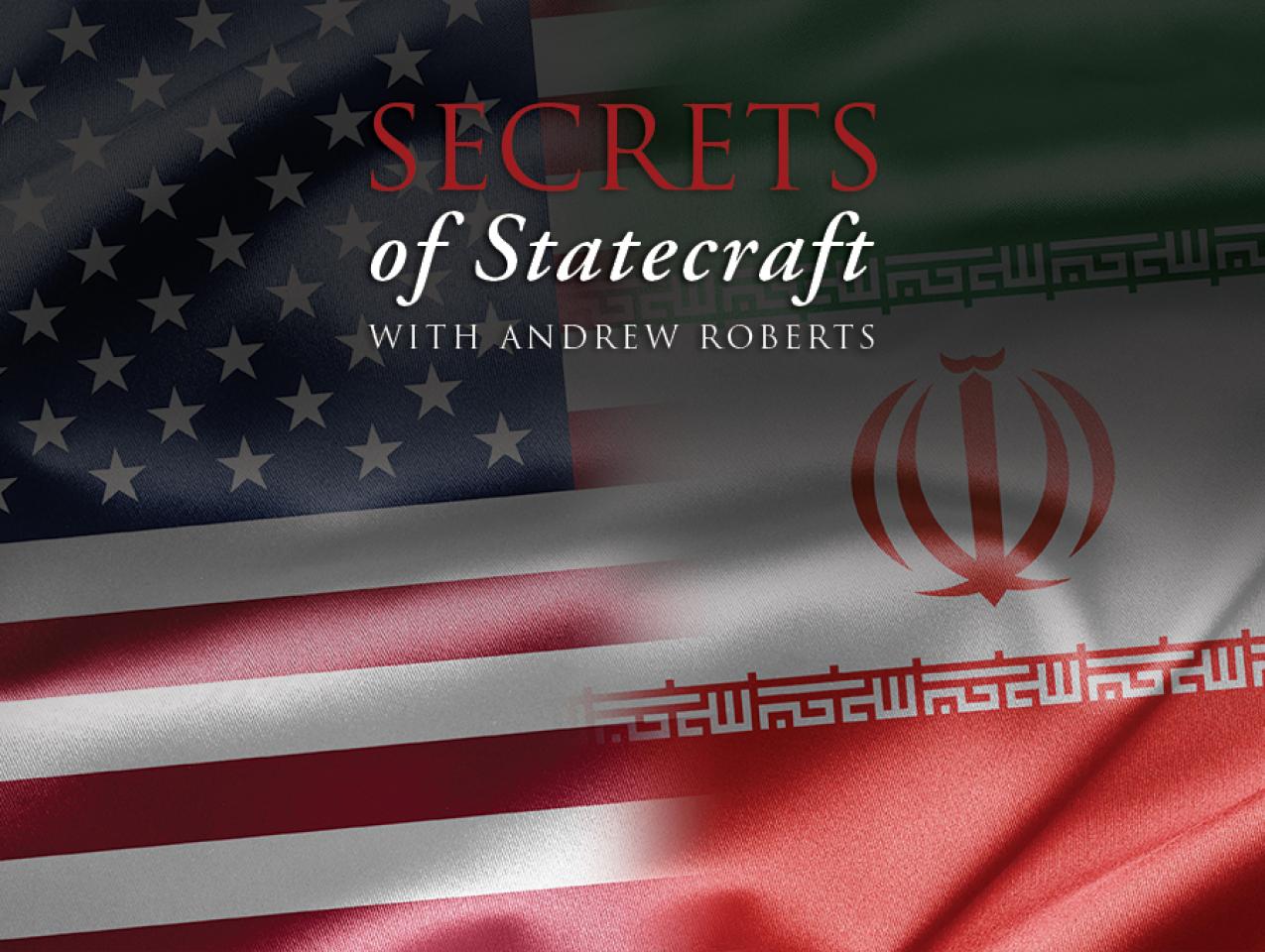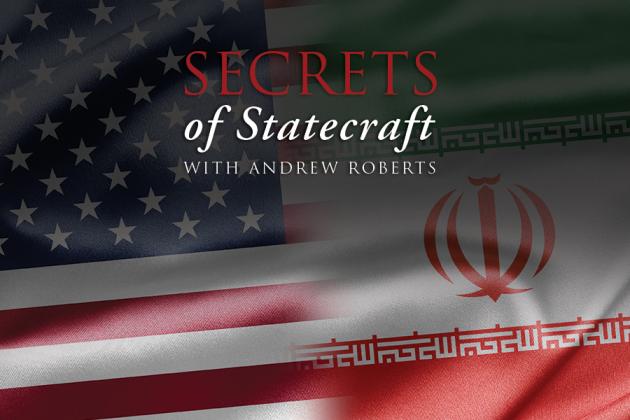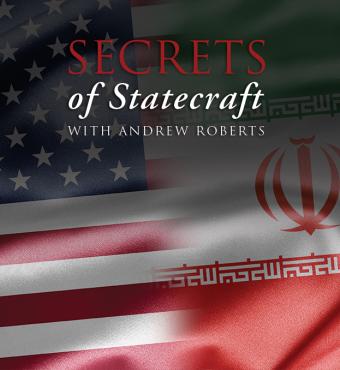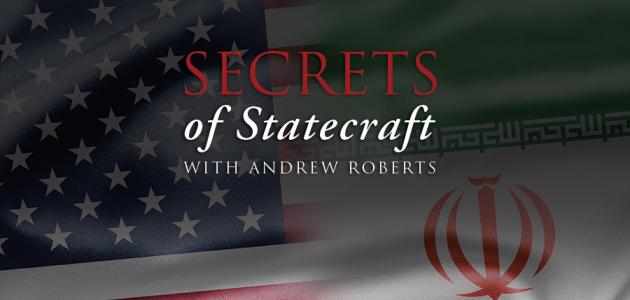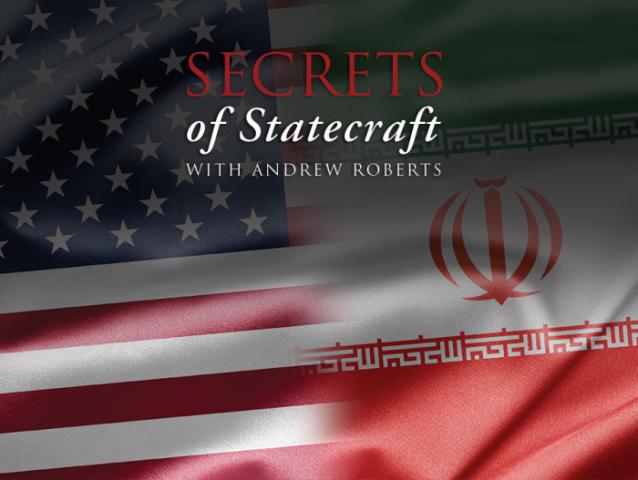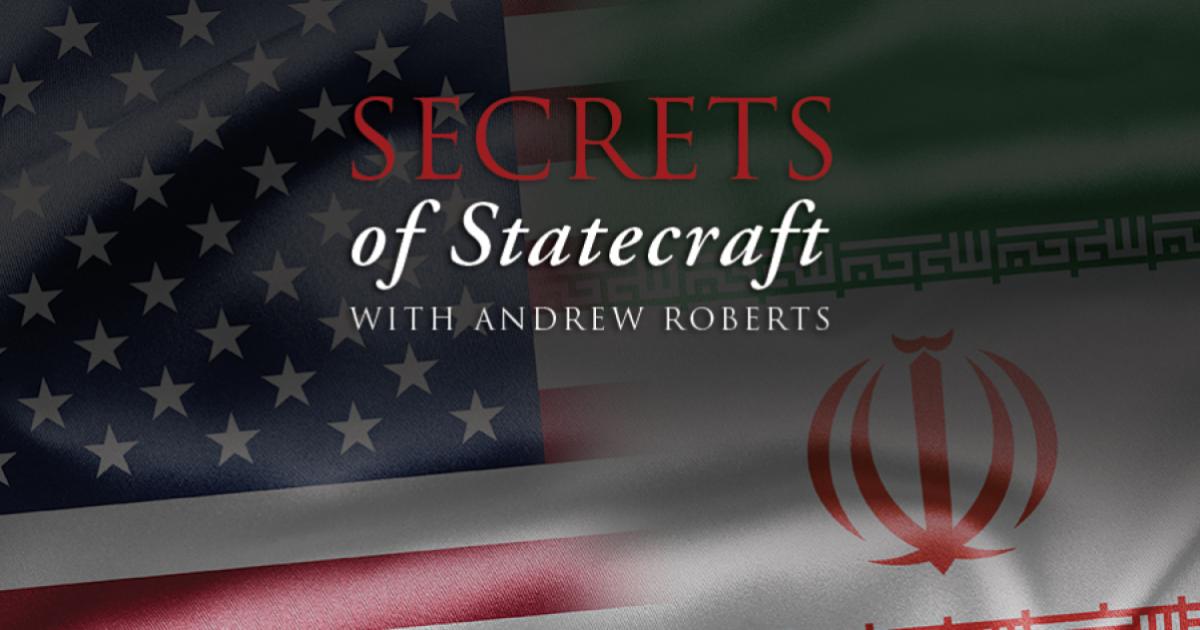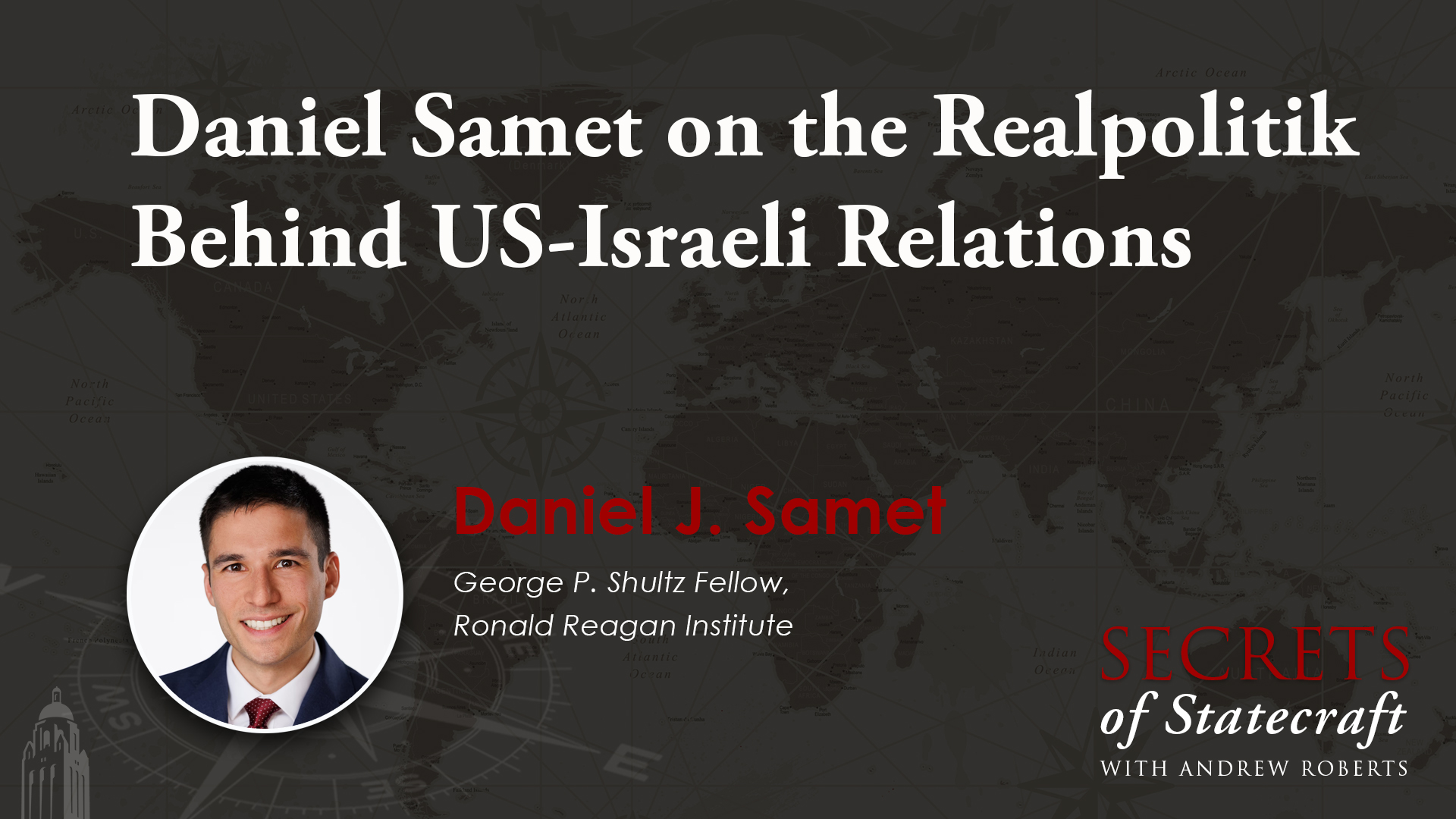- History
- US Foreign Policy
- Determining America's Role in the World
A new book, U.S. Defense Policy toward Israel: A Cold War History, takes on the revisionists over what happened in the Cold War.
Recorded on April 16, 205.
WATCH THE VIDEO
>> Andrew: Daniel Samet is the George P Schultz Fellow, with the Ronald Reagan Institute and the author of a newly published book, US Defense Policy Towards Israel, A Cold War History. Daniel, you've published a book, I think today, titled "US Defense Policy Towards a Cold War History", and first of all, many congratulations on it.
It's an excellent read and obviously the result of a huge amount of work. But it has got some pretty strong controversial, I'd say, arguments to make, and I wonder if we could just go through them later on. We'll go through the nine presidents from Truman to George HW Bush that each of whose presidents you go into with regard to this very important aspect of American foreign policy.
But let's start with the big takeaways and do the individual presidents later. You argue that interest drives foreign policy, essentially, and that lots of people have got lots of other ideas about what ultimately are the reasons behind US decisions towards Israel and Israel's decisions towards the US. But ultimately, actually you take a very realpolitik sort of Henry Kissinger line that it's interests.
Tell us more about that.
>> Daniel: Precisely. First of all, your lordship, it is great to be with you on your podcast. I'm a longtime listener and very much a fan. You recapitulate my argument very well. It's to a T. I argue in this book that interest, strategic interests more accurately, have driven American policy toward Israel since 1948.
Many people, let's call them the realists, would say that's true of any bilateral relationship, that's true of US policy toward any country. And yet those same people, when it comes to Israel, often hew to a very different line. I'm thinking in particular of the 2007 book the Israel Lobby and US Foreign Policy by John Mearsheimer and Stephen Waltz, two giants in the discipline of international relations who have been prolific scholars for a long time, who very much argue that interests, not domestic politics, drive foreign policy.
And yet when it comes to Israel and the US Israel relationship in particular, they forget their priors and become obsessed with domestic politics. That was very much the trend I wanted to argue against. I had always been skeptical of that view. And when I dug into the archives and really immersed myself in the decision-making on the American side, I came away with a wholly different conclusion than Mearsheimer and Waltz.
I found that not only presidents but members of the cabinet, secretaries of state, secretaries of defense, national security advisors and their subordinates were preoccupied with American interests, with American security, American prosperity, American liberty, and they had very little, they had spared very few thoughts for domestic politics. For the Israel Lobby, for American supporters of Israel and for American opponents of the Israel relationship.
They didn't care about those things. In these memoranda that I consulted in correspondence with foreign leaders, they were concerned first and foremost with the well being of the United States and with American interests. I really wanted to highlight that point in this book and I think that it deserves more attention, especially in our current day when the US-Israel relationship is very much in the news.
>> Andrew: Let's just talk about some of those other things. Those values that you say matter less. You mentioned the fact that Israel of course is the only democracy in the region and that it's got a free press and has, you know, gay rights marches and things like that.
But are these values that one would imagine would matter terribly much to American foreign policy considering that America is, you know, the most powerful nation in the world and so obviously its interests have got to come first. Is it something you know, that I know lots of people say they do matter, but would one intellectually?
You're a doctoral or have been a doctoral fellow at the Henry A. Kissinger center for Global affairs at Johns Hopkins. In your arguments on real politique and so on, you are very punchy in this excellent book about all this. But would you have expected anything else really?
>> Daniel: Let me clarify two things, Andrew.
First of all, I'm not saying that values and shared Judeo Christian history do not matter at all when it comes to the US Israel relationship. What I'm saying is that they matter far less than hard strategic interests. That, that is the point that I want to underscore. Second point, while I was a fellow Kissinger Center at Johns Hopkins sites, I don't consider myself a Kissinger disciple.
In this book I was trying to be a dispassionate scholar. I wanted to peruse the archives, collect my findings and present them in a coherent way when it comes to American policy toward Israel during this time in question, which really the heart of it is really 1960, let's say to 1990.
In those, in that 30 year, in that 30 year timeline, I found very little discussion of values when it came to US Foreign policymaking, very little discussion of Judeo Christian heritage. Now let's not be, let's not be unclear when it comes to the political conversations about Israel, even at this time, especially members of Congress were making appeals to our shared Judeo Christian heritage, the sole democracy in the region.
Those arguments I do think are powerful politically and I can understand why members of Congress would make them in public. But in private, when really the rubber meets the road and the stakes are very high and decision makers are deciding what to do with regards, as regards a certain one policy or another, those things figure, do not figure prominently at all.
What merely matters is hard strategic interests.
>> Andrew: Yeah. And you've done interviews with dozens of senior decision-makers. You've consulted all the presidential libraries. The work that you've done for this really does underline the power of your argument. Let's talk about the pro-Israel lobbying concept and how overstated it's been because the Mearsheimer and Waltz book, which was tremendously controversial when it came out in 2007.
You come up with a couple of very powerful arguments that actually America has taken decisions that were not in the slightest bit in the interests of the pro-Israel lobby, primarily the AWACS decision and the JCPOA decision. Would you like to go into both of those and show us how they illustrate the, if anything, the weakness of the pro Israel lobby in America?
>> Daniel: Of course, let me state the Mearsheimer Walt argument in the most charitable way possible. They would say that throughout the course of many decades now, there has been a pro-Israel lobby, which is mostly but not exclusively Jewish, that has pushed Americans Middle east policy in directions inimical to American interests.
They see the lobby as serving primarily the interests of Israel, not the national security of the United States. Those two episodes that you mentioned really, in my view, put the lie to that argument. Let's talk about first, the awac sale of 1981 when the Reagan administration took office.
When the Reagan administration came into office in 1981, it resolved to sell the AWACS, which was an aerial reconnaissance system, to the Saudis. The sale was very controversial at the time. The Saudis, we might remember, had implemented an oil embargo against the United States a few years earlier in the 1970s.
They were a repressive regime. They were not the easiest people to like. And the American people were very skeptical of this proposed sale. What the Reagan administration had to do was fend off a challenge from the Legislative branch which sought to block the sale. I won't recapitulate all the details of that, but there was a vote in the House of Representatives to kill the sale and it passed by considerable margins, meaning that if the Senate voted to block the sale as well, the sale would be killed.
What the Reagan administration had to do was fend off a ferocious challenge from the pro Israel lobby, which was very much opposed to the idea of awacs. Their argument was this represents a existential threat to the state of Israel because the Saudis are nominally an enemy of Israel.
They're an enemy state and we can't give advanced American technology to them. The PROSER lobby was very much opposed to AWACS for the Saudis and they lobbied members of Congress ferociously in that direction. When it came time for the Senate to vote, it was very clear to the administration that they did not have the votes in the Senate.
And thanks to the efforts of White House Chief of Staff James Baker and National Security Adviser Dick Allen, the administration was able at the 11th hour to whip the votes. And it ended up being, if I recall correctly, a 5248 decision in the administration's favorite, meaning that AWACS would go through after all.
Now, if the Israel Lobby is all powerful, as some seem to think, how come they couldn't get a majority in the US Senate at the time to vote against the AWACS sale? That was one episode you mentioned, the JCPOA in 2015, which isn't really in my book, because my book cuts off in the early 90s, but also think illustrates the ineffectiveness of the Israel Lobby, which at the time was very much against the jcpoa.
They were against that Iran deal that the Obama administration negotiated. And yet the Obama administration proceeded to include the JCPOA with Iran. There's one other episode that is in my book that I would like to mention, which is in 1978, the Carter administration decided to sell F15s to the Saudis and F5s to Egypt.
@ the time, the Israel lobby was very much against those sales as well, but they went through and Carter in his diary actually called them a big defeat for the pro Israel lobby. Those are three episodes I mentioned I could talk about more. But those three, I think are illustrative of the impotence really of the pro- Israel lobby when it went to battle with the administration, oftentimes it lost.
>> Andrew: Yeah. And that's another very interesting aspect of your book, is the tensions between the key decision makers in America and Israel. One thinks obviously of the times when presidents and Israeli prime ministers get on with one another, but actually instead of being in accord for most of the time, they come over in your book as a sort of bitching married couple, essentially where they know they have to get on ultimately when it comes to the decisions.
But boy, will they have routes. Tell us about some of those.
>> Daniel: No question. If members of one's own family can't get along, why would you expect leaders from two separate countries with distinct cultures, political systems and economies to get along? It really, as you know, Andrew, can be a nightmare to negotiate with other countries and other leaders from those countries.
In terms of the tensions, we could go all the way back to the Truman administration, which although it did recognize the State of Israel 11 minutes into its existence, which is a famously cited fact, actually imposed a near total arms embargo on the state of Israel. We today think of Harry Truman as being very much a pro Israel figure for his recognition.
But he and the rest of his administration were almost unified in opposing the sale of weapons to Israel because they feared that doing so would alienate the Arab states, which they very much wanted to court. Remember, this was the Cold War context. It was a zero sum game.
If one side was. If one camp, let's say the Arab states went to the Soviet Union, that would be a loss for the United States. And conversely, if they were in America's camp, that was a loss for the Soviet Union. Israel at the time was a small, weak state.
It didn't really have a whole lot to offer the United States strategically. And the Arabs control the much larger territory. They had oil out of the energy reserves, more people, more military power. It was really a no brainer for the Truman administration. The Israelis, for their part, were upset and perturbed by that decision.
They came calling many, many times asking for weapons. Ben Gurion, who was very sympathetic to Truman and liked Truman personally and told him he would go down as a very important figure in Jewish history for recognizing the Jewish state, was disappointed on many occasions by Truman's refusal to sell weapons.
The same for the Eisenhower administration, which was not emotionally attached to Israel in the way that Truman was, also refused to sell weapons. It was only in the Kennedy administration in 1962, when Kennedy decided to sell Israel anti-aircraft missiles, the Hawk anti-anti aircraft missile, to be precise, that there was a major weapons sale.
Now from 48 to 62, that's 14 years of a near total refusal to sell Israel any weapons of significance. That's a pretty big point of tension in their relationship. That's just one. I could talk about others if you want.
>> Andrew: Well, actually, no, because this is not just a history show, but Also Current Affairs 1.
I'd like to jump forward because we're going to go through the presidents later to something that's completely outside your book, which is the Trump Bibi relationship. How do you see that? Does that fit in naturally with the overall sort of argument arc of your book?
>> Daniel: It does.
Now, if you're only watching TV and only going by what you see on the screen and in the reporting, you might get a different picture. You might, if you're a casual walker watcher, think that Netanyahu and Trump are simpatico, their best buds. They see the world in similar ways, they're similarly positioned ideologically and they get along smashingly well.
In reality, that's not entirely true. I certainly would say that the Netanyahu Trump relationship is stronger than the Netanyahu Biden relationship, which was, as we, as we saw, was marked by periods of great tension in private and in public. In terms of the Netanyahu-Trump relationship, there are certainly periods of great tension that we're not seeing in public in the same way they're taking shape in private.
I'll give you one example from the first Trump administration. We had very pro Israel figures like Mike Pompeo, who was Secretary of State at the time, and John Bolton, who was National Security advisor, really lay into the Israelis for their relationship with China. They threatened to pare back intelligence sharing if the Israelis didn't limit their economic ties with the Chinese.
That's one example. If we fast-forward to this administration, there are some serious disagreements, in my view, between the Trump administration and the Netanyahu government over what to do about Iran, the hostages, the war in Gaza. The picture they might want to portray for the cameras is certainly very different from what's going on behind closed doors, where people are much more frank and candid, and the Israelis, of all people, have never been shy about voicing their views.
And one would assume the Trump administration isn't shy about sharing its, its different views, especially with the Israelis, behind closed doors. This very much coheres with what I found with other presidents and other Israeli prime ministers and other American officials and other, and their Israeli counterparts, too.
>> Andrew: Yeah, it definitely seems to fit in with the arguments that you make in this book, the relationship, the modern relationship.
And as does, it strikes me, the idea that Congress tends to be more pro Israel than the White House, not necessarily this present White House, but in general, Congress is more supportive, isn't it?
>> Daniel: In general, that's true. For sure, when you're a member of Congress, you have lots of things on your plate.
Even if you're a member of Congress who specializes in foreign policy, national security, of which there aren't that many, to be frank, you still have just a few staff supporting you on these issues, and you're being pulled in all sorts of directions. Conversely, when you're in the administration, in working on foreign policy, national security, you can get much more into the weeds on particular issues.
If you're in the Department of State, you have wide reign to work on foreign policy. And likewise, if you're in the Pentagon, you have free reign on lots of these defense policy issues, too. Ultimately, though, key questions of foreign policy, national security come down to the commander in chief, and that's the President.
He can afford to be very targeted in how he goes about making these decisions. He's oftentimes not concerned with domestic politics, which is what I argue. He's concerned with what's in the best interests of American national security, what's best for American security, American liberty and American prosperity. Lots of times in Congress they were supportive of Israel because in the view of lots of these members, they thought Israel is a good country.
It's a bastion of liberal democracy in a sea of totalitarian regimes, it's a pro-American country. We're generally aligned on these key foreign policy issues, we should do all the Israelis asks. We should sell them these weapons, we should support them in this war. They need our full-fledged support.
However, when it comes to the administration, things aren't always as clear cut. I'll give you one example. During the 1973 Yom Kippur War, there was a question, when the war in its initial stages was not going very well for Israel, of whether the administration should resupply the Israelis right away.
Many in Congress felt that there was no question about it. Of course the United States should come to Israel's aid. It's at risk of being overrun both by the Syrians and the Egyptians. We have to come to Israel's defense because if we don't, things could really go south and we could lose Israel and lose our key partner in the Middle East.
The Nixon administration, which ultimately did decide to oversee a massive resupply of the Israelis, at first was unsure of what to do because there were other considerations. We can't risk a confrontation with the Soviets in the Middle East because they were the key backers of Egypt and Syria.
And it's not simply a question of whether we should defend Israel in its hour need. There were other considerations at play.
>> Andrew: And Henry Kissinger came under tremendous criticism and attack from Jews in America, of course, but also Israel itself for not resupplying the kind of weapons they needed as quickly as he did.
Ultimately, he did do that, didn't he? He took that stance and ultimately the armed supplies started, but not for some time. And the struggle was a very serious one, wasn't it?
>> Daniel: Indeed. I really get into this in one of my chapters. It was a ferocious back and forth between the Americans and the Israelis.
I was talking to Richard Pearl, who ended up serving in the Pentagon in the Reagan administration. And at this time in 1973, he was a key staffer on the staff of Senator Henry Jackson of Washington State, who was perhaps the staunchest Zionist in the Senate. He remembered talking with the Israeli ambassador and the Israeli ambassador got a call from.
He remembered being in the room and the Israeli ambassador was getting a telephone call saying that American creditors were not willing to give the insurance for American planes flying into Israel. Meaning that at that time it seemed like the resupply was off. And he remembered the Israeli ambassador hung up the phone, looked at him and started crying because he was convinced that that was the end for Israel and the resupply was not going to go forward.
Ultimately it did, but not tremendous controversy. American Jews, I think, had a special. Many American Jews had a special contempt for Henry Kissinger when it came to Israel policy. They saw him as not being a true friend of Israel of the world's 1 Jewish state. They saw him as needlessly cold and unfeeling, unsympathetic.
Kissinger would argue that he was trying to be balanced, dispassionate and really trying to implement and effectuate U.S. foreign policy decisions in the way that was best for the United States. Regardless of what perspective you have, it was a time of severe disagreement between the administration and the pro Israel lobby and many members of Congress as well.
>> Andrew: Do you think the fact that Henry, who's been on this show, by the way, along with Bibi Netanyahu, do you think that the fact that Henry was Jewish, one of the very rare Secretaries of State of the United States who was Jewish, might have been affected in that way?
He had to. In all of these decisions, he had to deal with the fact that there are 22 Arab states or, you know, non Jewish states in the Middle east that you have to. The United States has to have good relations with. Do you think that a gentile Secretary of State could perhaps have been more pro Israel during Yom Kippur?
>> Daniel: It's a good question, and it's not entirely counterfactual in that we have many examples of gentile Secretary of State and other members of the Cabinet who were very pro Israel. George Shultz, for whom my postdoctoral fellowship at the Ronald Reagan Institute is named, was very pro Israel, as was his predecessor, Alexander Haig.
Those are our two Secretaries of State who, who were very Zionist, very pro Israel in orientation. When it came to Kissinger's viewing this, it's curious that you asked that question because Nixon actually writes in his memoir that he at first forbade Kissinger from working on Middle east issues because of his Jewish background.
Nixon, at least his justification for it was that Kissinger's Jewishness would cloud his judgment and make him a partial interested party in these negotiations with the Arab states. Kissinger, for his part, when he was living, actually did not discuss his Jewish background very much. He didn't make it a central part of his life.
Now others who've written about Kissinger actually, think that it was a larger part of his identity than he let on, regardless when it came to the 73 war, I think there's a lot to your question, Andrew. I think Kissinger was rather consciously or subconsciously striving so hard to be a dispassionate observer that he may have come down hard on the Israelis when it wasn't warranted.
>> Andrew: Going back to the idea of Congress and being more pro Israeli, let's have a look at the what, for want of a better word, one would call the anti Israeli lobby in Congress, particularly AOC and the Radical Democrats. They wouldn't call themselves that, of course, but nonetheless, we hear a lot and have heard a lot about the Jewish vote in America.
But what about the Arab vote in Michigan and elsewhere, do you think that has an effect on the opposition to Israel?
>> Daniel: Now I'm talking about contemporary issues and I just want to be clear. These views are mine and no one else's, I think it's unquestionable. Biden, in last election cycle, at least when he was the candidate, according to reporting, was obsessed with the possibility of losing Michigan, which was one of the key swing states in the 2024 election, which is home to a large Arab American community.
Biden, the thinking was, didn't want to be seen as overly pro Israel because he was trying to curry favor with those voters and he was afraid that a strong policy in favor of Israel might lose him thousands, perhaps tens of thousands, maybe even hundreds of thousands of votes in Michigan for that reason and with those votes, the entire state and perhaps the entire election, we certainly saw a similar pattern.
When Kamala Harris got the nomination, she was leery of alienating the Anti-Israel vote, remember that? When she was being heckled by one protester who was spouting some anti Israel slogans, she actually said, they have a point. There's a point to that. It was clear she was catering to that wing.
Now it didn't really matter because Trump won on on an unambiguously pro Israel platform. I do think, however, that this issue is not over. There was a Pew poll that came out recently showing that support for Israel is well under 50% in the Democratic Party as a whole.
In the Republican Party it's still a sizable majority. I don't remember what the exact number is of Republican voters who support Israel, but actually among young Republicans it's under 50%. The Anti-Israel Coalition is ascendant in the United States and this issue is not going away.
>> Andrew: Between 1948 and I think the present day, the United States has spent over $100 billion on security assistance to Israel, what's it got in return?
>> Daniel: During the Cold War it got the United States a reliable anti communist partner. Let's remember that at this time during the Cold War there weren't a lot of states, there were some states that were allied formally with the United States. NATO, Australia, New Zealand, Japan are a few.
But the majority of the world was was up for grabs and it was a zero sum game. The United States had to be very prudent in how it went about selecting partners and oftentimes it couldn't afford to be all that choosy. It was a choice in the Middle east between Israel and the radical Arab states.
Many administrations, few administrations actually tried to cast their lot in with the radical Arab states. With President Gamal Abdel Nasser of Egypt 1, and they were rebuffed because Nasser ended up choosing the Soviets instead, that left Israel as the main source of American strength in the Middle East.
Together one might argue with, with Turkey and perhaps the Saudis and Iran as well. But I would argue Israel has been a remarkably consistent partner. They they've sided with us on most if not, if not many, if not a majority of the key security questions at the time.
They've been an invaluable partner in the war on terror in more recent decades. They fiercely resisted Soviet penetration of their borders and of their neighborhood during the Cold War. They've been very strong partners to us recently. It's been a sensible purchase and yet it has been an expensive purchase and as the question of when the question of military aid is concerned, there are a growing number of people, both the United States and Israel, who are arguing that Israel should wean itself off of military aid because now it's a rich country and it doesn't need American largesse to defend itself.
But that's a separate question.
>> Andrew: Who would you say have been the Israeli Prime Minister as we've mentioned, you've mentioned David Ben Gurion and obviously by extension with regard to the Yom Kippur War, Golda Meir, we've mentioned Bibi, who've been the Israeli prime ministers who've essentially played the Americans best, who've, I don't mean that in a negative way at all.
Have been most successful at fostering a relationship that hasn't seemed like the bitching married couple, but actually has been a sort of the property, a proper friend, genuinely friendly, close relationship, what are the sort of exceptions that prove the rule, as it were?
>> Daniel: It's hard to select one because in most cases it has been a bitching old married couple.
If I had to pick one though, I'd probably pick Netanyahu, just because he's been in power for so long, he has had tense relationships with not only Trump and Biden and Obama, but also Clinton. And yet I think he's been able to navigate, when, when you tune out the noise.
He's been able to navigate each relationship pretty well, I think, and he's been rewarded for it politically. In Israel you don't be prime minister for as long as he has by having a horrible relationship with American presidents and U.S. government. But by and large it's been a tale of tension, disagreement and discord between the American and Israeli sides.
>> Andrew: Yeah, and that comes out very strongly from your book, what you were saying earlier about the Truman and Eisenhower administrations, their refusal to sell arms to Israel and so on, the limited cooperation between them. Eisenhower in particular thinking of Israel as a strategic liability rather than a great asset.
Then you have JFK, which as you mentioned, sold the hawks and everything rather changed and continued and deepened, if anything with LBJ, why was it, what was it about JFK in particular that set America on this quite new aspect of policy towards Israel, do you think?
>> Daniel: Like Truman, JFK was in his bones emotionally for Israel.
He was a staunch Zionist. He believed in the right of the Jewish people to self determination in his ancestral homeland. He made that very clear when he was a senator and when he was campaigning for the presidency when he took office. I'm not saying those things change. In fact, they didn't change.
They remained the same. What did change was the strategic situation on the ground. It was the contention of the Truman and Eisenhower administrations that not only did Israel not really need the weapons from the United States, it would be counterproductive for, for the United States to provide those weapons.
A secondary consideration was at the time, France was Israel's main arms supplier and was sending them quite large numbers of weapons that could really fulfill their defense needs. So it was, it was unnecessary for the United States to step in. When 1960, 1961, 1962 rolled around, the arms balance had changed dramatically.
Syria and Egypt were getting advanced weapons from the Soviets. They were getting bombers, they were getting fighters. And the aerial balance of power was shifting dramatically toward the Arab side. Kennedy asked his administration to look into this and to make some determinations about what was needed. And even the state, which was disinclined to, to favor Israel in any way determines that the arms balance was, was shifting decidedly against Israel and in favor of the Arab states.
At the end of 62, Kenny had a decision to make. Does he sell the Hawk anti-aircraft system to the Israelis, which was state of the art, and which would help deter attacks from the Arabs, or did he do nothing? And he decided to do the former and sell them the weapons because he thought they legitimately needed them and the United States was really the only patron that could provide them.
>> Andrew: And then we come on to Richard Nixon. You've already mentioned about Yom Kippur, but Nixon is pretty much on the record for being pretty anti-Semitic, wasn't he? He came out with some pretty foul anti-Semitic remarks even during his presidency, but despite that, he deepened ties, didn't he?
What do you think's going on in the, in the mind of Richard Nixon?
>> Daniel: Nixon is one of the most fascinating characters in American history. A man brimming with contradictions. A man both brilliant and sloppy, a man both honest and dishonest. The list goes on and on. There's no question he made anti Semitic remarks.
The New York Times has reported on this. Kissinger himself was subject to a lot of those brick backs, and he just took it again and again for whatever reason. When it came to Israel, though, the story was strange because Nixon actually had a very warm relationship with Prime Minister Meir.
He describes her in his memoirs as being someone who could be both warm and cold, motherly and adversarial at the same time. And I think Nixon respected that. He respected strength, he respected leaders who really were in command. And my ear, for all her deficiencies, was a very strong leader and knew how to game the Israeli political system and knew how to play the States pretty well, all things considered.
But that's not to say that Nixon didn't take some anti-Israel measures. He slow walked deliveries of jets. This is before the Yom Kippur War. One would say he was playing political games in hopes of arriving at some quixotic Arab Israeli settlement that certainly did not materialize right away.
He verbally could be tough on the Israelis in a way that was upsetting to them. However, in 1973, in October 73, when push really came to shove and looked like Israel might go down the tubes, in the words of one document I consulted, Nixon decided to greenlight an air supply because he didn't want Israel to be lost to the Soviets.
He didn't want them to lose the war. If they lost the war, that would be very bad for American grand strategy. Nixon wanted a strong Israel that could help balance the radical Arab state states and keep the Soviet influence in the Middle east limited. That's all he really cared about.
He wanted a stable world, a stable balance of power, and one in which the Soviets couldn't dominate the Middle East.
>> Andrew: And would you think it, would you say that it's fair to say that Carter, Jimmy Carter was the most pro Palestinian of the presidents during your period 1948-99?
>> Daniel: During this period for sure. There's no question about it. One can make an argument that Eisenhower was perhaps a more anti-Israel president. But Eisenhower was not pro-Palestinian by any stretch, whereas Carter was. He sympathized deeply with the plight of the Palestinians. He saw them as a victimized, oppressed people at the hands of the Israelis.
And this is consistent, I think, with Cardo's worldview. He's got a long track record of working in favor of whom he sees as the downtrodden, the marginalized, the oppressed members of the global community. That was certainly the case after he left the White House and I think was the case when he was in the White House as well.
He liked some of the Israelis. He, I think was a Zionist in his bones. I think he believed. He certainly believed Israel had the right to exist. He certainly believed the Jewish state was the result of a historical imperative. He believed the Jews had a right to self-determination in their biblical homeland and their ancestral homeland.
At the same time, though he didn't like a lot of Israeli policy. He thought that their bombing campaigns at Lebanon, this is before the 1982 invasion in the late 70s, were disproportionate, unnecessary, might even say barbaric. He didn't like Israeli policy in the west bank, in Judea and Samaria, and in the Gaza Strip.
He didn't like the occupation, for lack of a better term. And he thought the Israelis oftentimes were an impediment to American grand strategy. He saw them, one could argue perhaps more than the Egyptians or the Syrians or the Palestinians or the Jordanians as the roadblock in negotiations. He had a vision that all these parties would put down their disagreements, sing Kumbaya, and somehow work out a mythical peace settlement.
If only the willpower were there now. It turned out what actually would drive a peace settlement was American strength and Israeli strength, not mythical appeals to some sort of higher power. That's not what did the job with Reagan.
>> Andrew: You go back to having a president who believes that Israel is a major strategic asset in the struggle against the ussr.
That meant another eight years of American support for Israel.
>> Daniel: It did and it didn't. Curiously, Reagan's time was also fascinating. I think Reagan, given that I'm at the Reagan Institute, is a greatest president of the 20th century, a wonderful man, a man of strategic vision, a man of moral clarity.
When it came to Israel, it was a mixed bag. During the 1980 campaign, Reagan had accused Carter and his administration of turning its back on the idea that Israel was a strategic asset of the United States. Reagan very much believed that it was a strategic asset, not a strategic liability.
He charged the Carter administration with believing that and acting on it when he gets into office in 81. The first major event in US Israel relations was Israel's raid on Iraq's nuclear reactor in June of 81. This was to the surprise of the Reagan administration. The Reagan administration didn't know that the Israelis were going to take such decisive action against Iraq's nuclear reactor and take it out.
Much of the administration was up in arms, especially diplomats in the Department of State. They thought it was, it was a catastrophe for American interests. They thought this would spark a regional conflagration. Reagan and his diary actually wrote that he swear, I swear, I fear Armageddon is near.
Those are some strong words from the American President. And it's true the Israelis didn't really consult the Americans they had under Carter, but Reagan's people were by and large ignorant of that. The punishment meted out by the Reagan administration was harsh words by Ambassador to the UN Gene Kirkpatrick supporting a resolution of censure, and also suspending deliveries of some fighter jets for a time.
Now, in the end, it proved not to be much significance because the jets were allowed to go. But at the time, those were some very harsh words from the Americans and from a president who many believed was a strong supporter of Israel. The following year, in 1982, after Israel invaded Lebanon and its invasion very much went south in Beirut, the administration was having some very frank, very coarse conversations with the Israelis telling them that they needed to get the hell out of Beirut.
They needed to, to wind things down. The killing of civilians needed to stop. The campaign was going on too long. And this is in Dennis Ross book, who interviewed Schultz at the time. Schultz remembers Weinberger, according to Ross's book, threatening to sever relations with the Israelis if they didn't get their ship in order.
Again, a period of tremendous tension between the two countries and really illustrates that it hasn't been smooth sailing since 1948. There have been periods of deep division and disagreements.
>> Andrew: Yes, and actually there are some overlaps there, aren't there, with the Biden administration stance with regard to Gaza.
Do you see that between the 1992 and what's happened more recently with American finger wagging at the IDF and what has been, what it's been doing in.
>> Daniel: Some continuity and some change. In 82, it was clear the Israelis had bit off more than they could chew. They were overextended, overstretched, they were going far into Lebanon when they really didn't have the capability to subjugate much of the country like that.
And the administration thought the Israelis were just, were overstretched, overextended, and they couldn't get the job done. And this was becoming a real crisis as a result of Israeli effectiveness and, and, and Israeli assertiveness. When it comes to the Biden administration, though, I think there is one key difference in that The Reagan administration's orientation was pro Israel, and yet the Biden administration's orientation, I think, was more anti Israel.
They thought that the Israelis were a strategic impediment. They thought that the Israelis, while it could be helpful on some matters, perhaps, in terms of Iran's nuclear program, we're gonna just make trouble for the administration, but there are certainly were parallels. For sure. For sure. A lot of tension you've written about, by the way.
You make me feel so old. I can remember Osric, I can remember AWACS, all these arguments, I think they happened before you were born, didn't they? Yeah, yeah, I suspected as much. I was born in 1992.
>> Andrew: Yeah. My. Yeah. Well, there we are. And even after. After the Lebanese invasion.
God, you make me feel old. You write in your book about the tyranny of the weak over the strong, tell us about that.
>> Daniel: Comes from a line from a book by Charles Armstrong, I think it was. It's actually about North Korea policy. My advisor, Jeremy Suri, who's actually written a book about Henry Kissinger called Henry Kissinger in the American Century, suggested that I put that in there because it really gets at the heart of this relationship.
You have one superpower, the United States, which is very strong and would seem to have all leverage. And yet on the other side, you have a relatively weak power. Israel, which certainly grew in power throughout this time, it got stronger militarily, its economy started to liberalize, its GDP per capita was going up.
And yet it's just a disproportionate relationship. It's one party that is very strong and one party that's pretty weak. We can call it the tyranny of the week, because the weaker side, it's counterintuitive, actually has quite a bit of leverage. They can make things very, very difficult for the United States.
We might think of France during the Cold War as another example. It was a constant thorn in the side of American administrations because even though they were nominally a member of NATO, even though de Gaulle left Integrated Command in the 60s, they were still a treaty ally of the United States.
And yet it seemed like at every turn the French were out to thwart American ambitions. They wanted a more independent European foreign policy. They, even though they didn't like the Soviet Union, they weren't entirely sold on the idea of two discrete blocs, the Soviet bloc. And the American bloc in de Gaulle for sure was, was an anti-American character in his bones.
That's another example, but I think it's an apt label to call this the tyranny of the week.
>> Andrew: You've said in this, in this book that a study of bilateral ties of the past might assist policymakers in shaping its future. And of course, that's pretty much what this podcast is all about.
Tell us a bit more about that, what you think policymakers, who should be reading this book, and many congratulations on its publication. Is it your first book?
>> Daniel: It is.
>> Andrew: Exciting moment.
>> Daniel: Thank you.
>> Andrew: One's first book and good luck with it. What should policymakers take from it?
And therefore, what should they learn in order to assist in the future?
>> Daniel: First of all, I think historical knowledge in this town in Washington isn't always as strong as it could be. People are dealing with all sorts of crises if they're in government, if they're in the policy world, and oftentimes don't make the time or have the time to do reading.
But they should, they should always make the time. They should always find the time to read biographies, to read historical studies like this. As regards the US Israel relationship in particular, if I want them to take one thing away from this, it's that domestic politics play a very small role in American policy and strategic interests really drive what's going on.
They need to crowd out, they need to tune out all the noise, all that background noise about the nefarious pro Israel lobby and the overwhelming pressure it exerts on American policy and just focus on core American national interests, on American security, on American prosperity and on American liberty.
And if they do that, I think they will come to see that Israel for a long time has been a strategic asset of the United States. And it's not this nebulous appeal to shared culture, to shared history, that keeps the strategic relationship intact. It's hard national interests.
>> Andrew: What history book or biography are you reading at the moment, Danny?
>> Daniel: I'm actually reading the War Memoirs of Charles de Gaulle, which came out last year in a reissue by Simon Schuster, and they are absolutely fascinating. An old high school French teacher of mine actually gifted me one of the volumes in French when I was 16, 17 years old.
And I confess I put Put it away in a box and it's probably wasting away in some basement somewhere, I confess, this time I did buy the English translation because it's easier to read. That said, though, they're rich. I know you reviewed them, Andrew, for the Wall Street Journal, they're rich with historical wisdom and the secrets of statecraft, as we would say on this podcast.
>> Andrew: Yeah, and Anti-Americanism and anti British sentiment as well, needless to say. And what's your favorite historical worth, what if you're counterfactual?
>> Daniel: I say favorite in that I'm actually terrified by the implications. A historian named Ben Steele, who's at the Council on Foreign Relations, I believe, wrote a book about this last year.
Let's say that in summer 1944, at the Democratic National Convention, Vice President Henry Wallace is not forced off Democratic ticket in favor of a certain senator from Missouri named Harry Truman. Meaning that In April of 1945, when Franklin D. Roosevelt dies of a cerebral hemorrhage, it is Henry Wallace and not Harry S.
Truman who becomes president. Perhaps your viewers know, perhaps they don't, that Wallace, who was vice president From I think 41 to 45, was a left wing character. He was, he was big into labor unions and all that, but he also had a. What one might describe as charitably a benign view of the Soviet Union.
And at worst, he was a Soviet sympathizer. Whereas Harry Truman, as we know, adopted very tough policies towards the Soviet Union. I shudder at the thought because let's say that Wallace is president in 45. Is the atom bomb dropped on Hiroshima and Nagasaki, which was perhaps the most consequential decision of Truman's presidency and absolutely the right one.
Do we get the Marshall Plan? Do we get the Berlin Airlift? Do we get the formation of NATO in 49? Do we get the National Security act of 1947, which, among other things, created the Department of defense and the CIA.
>> Andrew: Do you think President Wallace would have waited 11 minutes, would he have waited an awful lot longer before America recognized Israel?
>> Daniel: That's actually the one thing he may have done right because like many left wingers at the time, he was an ardent Zionist and he did support the state of Israel. So I do think he would have acted similar to Truman in recognizing Israel very soon into its existence, that's, I think, the one thing, the one salutary benefit of one salutary achievement of his foreign policy, of his prospective foreign policy.
>> Andrew: That's a really, thank you. That's a really interesting. What if, sorry, were you going to say something.
>> Daniel: It really goes it really goes to show that men, for better or worse, drive history. And thank goodness we had Harry Truman in the White House in the early Cold War and not somebody like Wallace.
>> Andrew: Yeah, yeah, Daniel Samets, the George P Schultz fellow at the Ronald Reagan Institute and the author published today of the U.S Defense Policy Towards Israel, a Cold War History for which best of luck, by the way. Needless to say, thank you very much indeed for coming on Secrets of Statecraft.
>> Daniel: Lord Roberts, it's been a pleasure.
>> Andrew: Thank you, Daniel. My next guest on Secrets of Statecraft is Tim Bouverie, the author of "Appeasing Hitler, Chamberlain, Churchill and the Road to War", and now his new book, "Allies at War: The Politics of Defeating Hitler".







